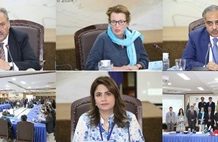The Institute of Strategic Studies, Islamabad (ISSI) hosted an In-House Meeting on June 10, 2015 with Dr Ansar Parvez, former Chairman, Pakistan Atomic Energy Commission (PAEC), who spoke on the subject of “Nuclear Energy”.
The meeting was attended by experts on the issue including Dr Zulfiqar Khan, Head of Department of Strategic & Nuclear Studies, National Defence University; Dr Zafar Iqbal Cheema, President Strategic Vision Institute; Dr Zafar Nawaz Jaspal, Director, School of Politics and International Relations, Quaid-i-Azam University; Mr. Waqar Butt, Member Corporate Advisory Council, Pakistan Atomic Energy Commission, Dr Rifaat Hussain, Head of Department of Government and Public Policy, National University of Science and Technology, Brig. Shauqat, Strategic Plans Division, Mr. Rana Ather Javed, Director General, Pakistan House; and Ms. Gulshan Bibi, Research Fellow, Islamabad Policy Research Institute.
The Chairman ISSI, Ambassador Khalid Mahmood welcomed the guest speaker, and mentioned the contributions made by Dr Ansar Pervaz to Pakistan’s nuclear programme.
Talking about the state of nuclear energy in Pakistan, Dr Parvez said that Pakistan has three nuclear power plants that are operational, four under construction, three in the pipeline, with plans to build many more. However, nuclear energy constitutes a small percentage of Pakistan’s total energy generation – about 4.4%. Talking about the energy crisis in Pakistan, he said that part of the problem was that the energy mix in Pakistan is poorly managed with oil, hydropower and gas taking large percentage of energy generation, with nuclear energy having a share of less than 5%.. The resulting energy deficiency means that most of Pakistan’s revenues are consumed by energy imports. The energy deficit problem is exacerbated by the fact that Pakistan’s energy demands are growing faster than its economic growth.
Dr Parvez said that Pakistan’s efforts to develop its nuclear energy sector have been hindered by many international regulations and embargos by the Nuclear Suppliers Group (NSG)that came in the wake of India’s nuclear explosion of 1974. Pakistan has had to bear the blunt of many such regulatory bodies and laws. Many of its nuclear power plant projects were cancelled in the wake of the 1974 Indian nuclear explosion. In such times, Pakistan has relied on China that has helped build many of its nuclear power plants including Chashma 3, Chashma 4, K2, and K3 power reactors, but which are encountering some international opposition.
By 2050, Pakistan’s nuclear energy requirement will be 40,000 MW, and Pakistan needs to plan ahead in order to meet its energy needs. He said that Pakistan needs to add 4000-6000MW annually to meet its energy requirements, and needed to invest $9-14 billion annually to meet those requirements.
Dr. Parvez’s presentation generated a vigorous debate on Pakistan’s nuclear programme.
Concluding the meeting, Ambassador Masood Khan, Director General ISSI stressed that it was imperative for Pakistan to integrate nuclear energy to its energy mix. He said that nuclear plants are being developed on schedule, and power generated by them is comparatively inexpensive. He stressed that Pakistan’s nuclear power plants are safe and secure by global standards, and the PAEC has proved to be the most efficient corporation in this regard. He lauded the role of the PAEC for successfully bringing the projects for nuclear power plants to completion and for sustaining them. He also praised the vital role of China in helping Pakistan develop its nuclear energy sector. Ambassador Khan said that Pakistan is a de jure nuclear weapon state and its nuclear energy plants are under IAEA safeguards. Pakistan would, he said, need a lot more than 40,000 MW in nuclear energy by 2050 because of growing consumer and industrial demand and unprecedented expansion of our economy.
Ghazala/10062015











